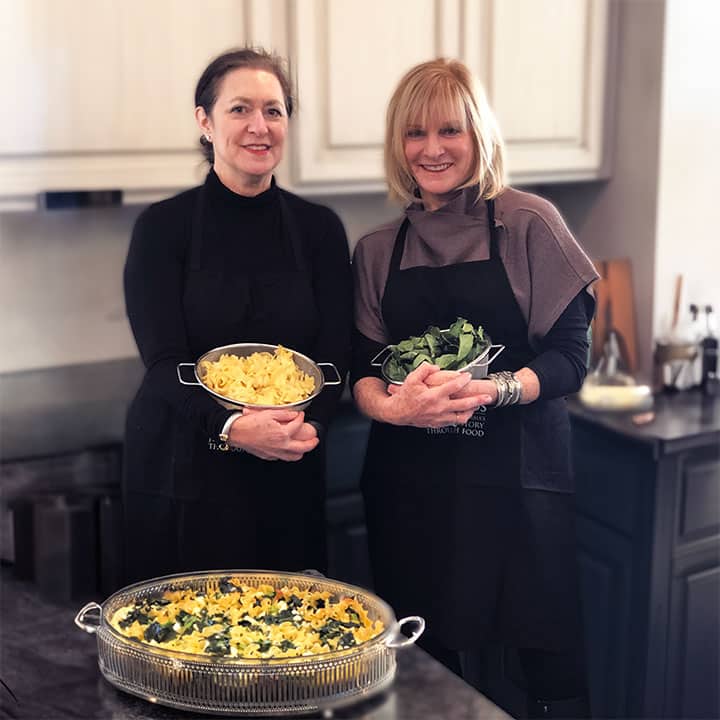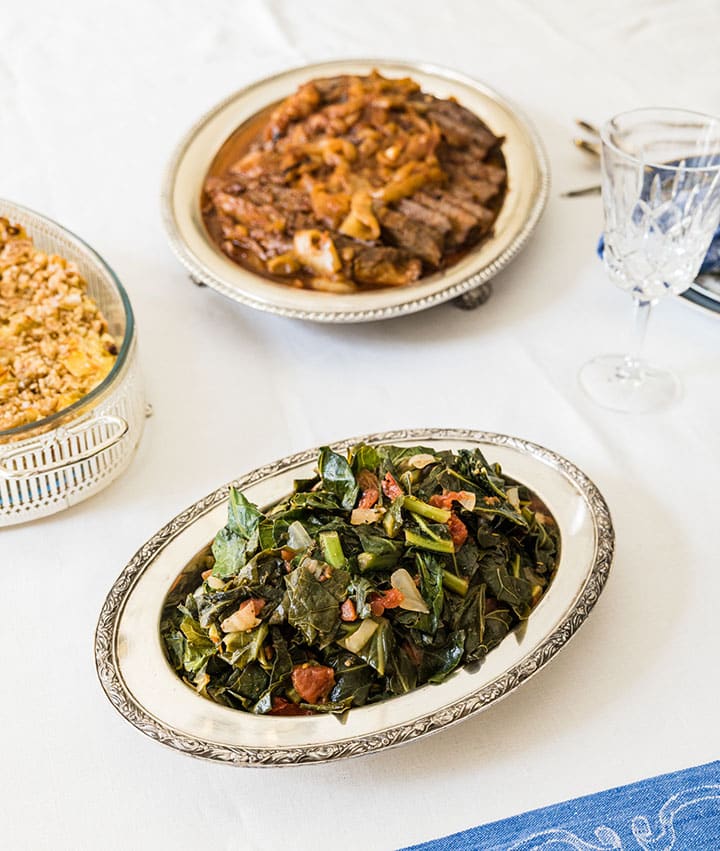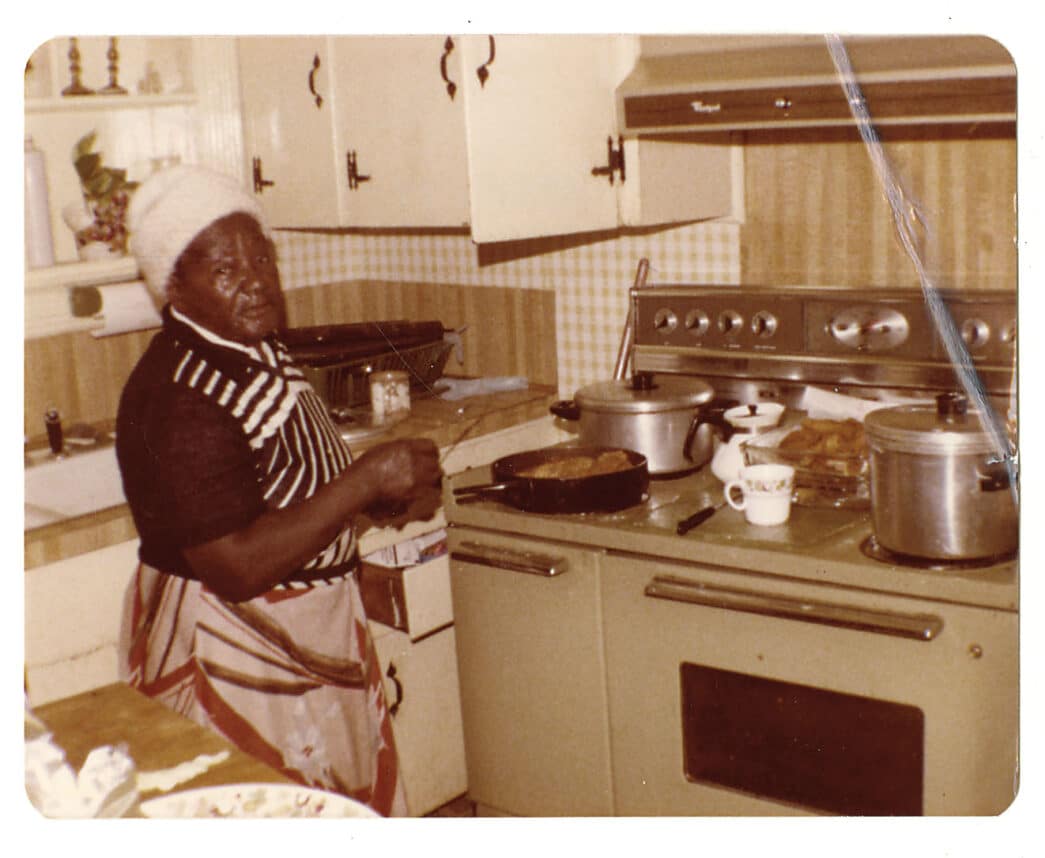
“Kugels and Collards: Stories of Food, Family, and Tradition in Jewish South Carolina,” by Rachel Gordin Barnett and Lyssa Kligman Harvey, explores the very personal history, along with the ingredients, that make Southern Jewish food so special. “A lot of people seem to be surprised by the Southern Jewish table, so we want to introduce that to a wider audience,” Barnett told the Journal.
 The authors hope their book sparks conversations about food and its place in family histories, and inspires people to write down their own recipes and share them with their children. “Rachel and I joked that this book could have been called ‘fried chicken and chopped liver,”” Harvey told the Journal. “We’ve had so many favorites; [people’s] memories are deep and emotional.”
The authors hope their book sparks conversations about food and its place in family histories, and inspires people to write down their own recipes and share them with their children. “Rachel and I joked that this book could have been called ‘fried chicken and chopped liver,”” Harvey told the Journal. “We’ve had so many favorites; [people’s] memories are deep and emotional.”
Featuring more than 80 recipes and stories, “Kugels and Collards” celebrates the tastes, smells and emotions connected to Southern Jewish food. According to Barnett and Harvey, a Southern Jewish table includes a wide variety of meat, chicken, starches and fresh vegetables.
“On that table for me would be brisket. But not any brisket, it has to be the one that I make, because that’s the one that has been passed down,” Barnett said. “[We’d also have] very good fried chicken that is not cooked in lard. … I’m not going to say it’s healthy, but it’s healthier. There is a homemade challah … and there is a beautiful array of vegetables, [including] butter beans, okra and tomatoes.”
To this table, Harvey would add okra gumbo, which is a stew of tomatoes, beans, fresh corn and okra, and her mother’s sweet and sour meatballs.
“I make it with patience and care,” she said. “They have a really good taste, and they’re great on top of rice. I make kasha varnishkes and of course chopped liver, so we’d have that to start off with, and gribenes.”
This labor of love is just that: A passion project. Harvey is a therapist, an artist and a teacher; Barnett is the executive director of the Jewish Historical Society. Both native South Carolinians, Barnett hails from small-town Summerton, and Harvey from Columbia. They live in Columbia and have been instrumental in preserving Jewish history across the state.
“Kugels and Collards” was the perfect opportunity to share their love of food, history, Judaism and the South.
“We have so many incredible recipes in the book, but I have to tell you there are so many that are also lost,” Barnett said. “We had to go into the kitchen, and it was trial and error trying to recreate some of these recipes, because they were told; they weren’t written down.”
“This has become an unintentional archive,” Harvey said. “When you ask people to remember who was around the table — Where were you at Passover? … Where were you for Hanukkah? Where were the latkes made? — It’s not only the smell, but it’s a place and time.”
The book wraps up with a chapter titled “Legacy,” where they invited young women, including their daughters, to contribute their food memories.
“Our food memories come from our mothers, our grandmothers, our immigrant grandmothers,” Barnett said. “These children … similarly talk about food as love … It was so joyous to read these stories. It really brought tears to my eyes.”
For instance, Barnett’s daughter recreated tuna noodle casserole, but made a healthy version; Harvey’s daughter wrote about their family’s Rosh Hashanah gatherings. The authors also discovered that a brownie recipe — Mimi’s brownies — thought to have been from Barnett’s daughter’s grandmother actually came from Harvey’s mother.
“She must have shared it with her friends,” Harvey said. “That recipe that was written on the back of an envelope or something.”
Harvey continued, “We love these stories, and we’re not finished. There’s so many more stories to gather and we hope this will promote more discussion.”
Get the recipes for kugel and collards below. Read more at KugelsandCollards.org.
For the full conversation, listen to the podcast:
Watch the interview:
Grandma Ida’s Lokshen Kugel
Lokshen is Yiddish for noodles.
8 ounces wide egg noodles
6 Tbsp butter
1 cup sour cream
3 oz cream cheese
½ cup sugar
3 eggs
raisins (optional)
1 cup milk
1 tsp salt
1 cup apricot jam
Topping:
2½ cups crushed corn flakes
¼ cup sugar
1 tsp cinnamon
Boil the noodles and drain. Add the butter and sour cream. Cream the sugar and cream cheese together. Beat the eggs and add to the mixture. Add raisins, if desired. Add the milk and apricot jam slowly. Add salt and mix all together. Put the mixture into a 9 × 13-inch buttered Pyrex pan.
To make the topping:
Mix the topping ingredients together and sprinkle over the kugel. (What could be more American than topping her kugel with cornflakes [as many Jewish home cooks began to do in the early twentieth century with the wide-spread availability of processed, convenience foods like boxed cereals]?) Bake 45 minutes to 1 hour at 350°F. Freezes well.
Makes 6 to 8 servings
* * *

Ethel Glover’s Collards

Ethel’s collards had a very straightforward but delicious recipe. There was no pork in the recipe she cooked for us, as our family was semi-kosher. She took a large bunch of collards and washed them repeatedly until the sand was gone. Then, she chopped the collards and placed them in a large pot. To the clean collards, add a pinch of sugar, salt, and pepper to taste, and a pat of butter. Cook until soft. These collards truly melt in your mouth. I have adapted Ethel’s recipe to include onion and tomatoes. Although fresh collards still abound, you can also purchase bagged collards chopped and ready to go.
1 Tbsp olive oil
1 small onion, diced
8 oz water or chicken broth
large bunch or 27-oz bag of collards (if in a bunch, clean and chop the collards)
2 tomatoes, chopped
salt and pepper to taste
½ tsp dried oregano
½ tsp sugar
Add olive oil in a large pot and heat. Add the diced onions and cook until translucent and soft. Add the collards, tomatoes, and water or broth to cover (~8 ounces). Add the seasonings and cook until tender, about 20 minutes.
Taste and adjust the seasonings before serving.
Makes 6 servings
Excerpted from “KUGELS & COLLARDS: STORIES OF FOOD, FAMILY, AND TRADITION IN JEWISH SOUTH CAROLINA” by Rachel Gordin Barnett and Lyssa Kligman Harvey. © 2023 Rachel Gordin Barnett and Lyssa Kligman Harvey. Used by permission of the University of South Carolina Press.
Debra Eckerling is a writer for the Jewish Journal and the host of “Taste Buds with Deb.” Subscribe on YouTube or your favorite podcast platform. Email Debra: tastebuds@jewishjournal.com.























 More news and opinions than at a Shabbat dinner, right in your inbox.
More news and opinions than at a Shabbat dinner, right in your inbox.